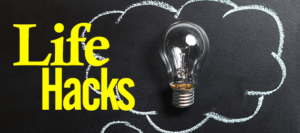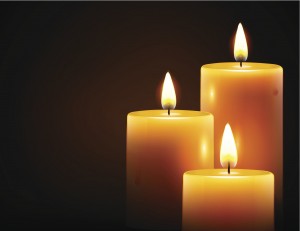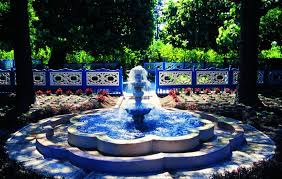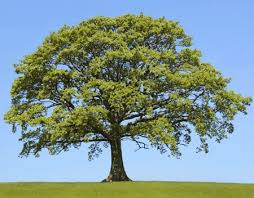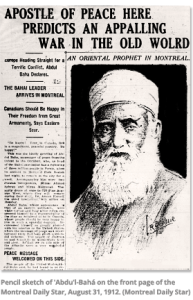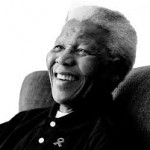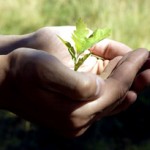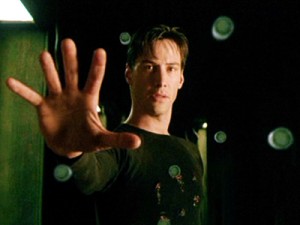[NINE-DAY READ. Okay, not really, but you *could* take each of the 9 spiritual life hacks below and make it your daily focus. Or take the 15 minutes or so now!]
“You can’t hack it!”
This was as derisive as we could get. This was contempt, as close as a small-town kid in the 1970s could come to putting a rival — and sometimes, painfully, even himself — in his place. You don’t have what it takes. You’re not tough! You just quit when things don’t go your way. (Later on, “You suck!“ took over, with more vulgarity and less nuance.) You get the idea. “Hacking it” was the idea of fighting one’s way through heavy undergrowth with a machete; for me, though, a more apt metaphor was less exotic — hoeing and hilling the backyard potatoes, maybe, or raking all the humps and stones out of the Edinburgh Square infield so the ground balls wouldn’t bad-hop us in the head. “Hacking it” meant taking your figurative least-blunt instrument and swinging, cutting, hacking our way through obstacles.
I suppose it later had the same connotation for the computer geeks looking to break code or bypass cybersecurity, hence “hackers”, which led inevitably to the concept of LIFE HACKS. Reddit forums, podcasts and twitter feeds offer all kinds of hacks and short cuts to living well. Video gamers exchange cheat codes that allow a player to jump past problems. Rami Malek won an Emmy for portraying a disturbed Hacker-As-Hero in Mr. Robot; we all want to hack the system, at least the unjust ones. (Okay, or watch movies where somebody prettier than us does.) But life hacks? Cheat codes to goodness? Can a few simple tricks pave the way to a life of nobility and genuine accomplishment?
Well, mostly no. “Life is suffering,” the Buddha persists in reminding us. (All the Buddhas have, in one language or another.) Looking for shortcuts and easy ways out doesn’t make for great leaders, inspiring artists, brilliant chemists or superb athletes, let alone someone on the “straight and narrow” path of spiritual enlightenment and wisdom. But while a life of goodness, higher awareness and peace of mind isn’t EASY to build, it also doesn’t have to be super-complicated. There are actions we can take, habits we can develop over time, that really do lead to contentment, to Soul Success.
Or, at least, this is what I’ve READ.
Still, my wife and I were inspired by an off-hand comment that Rainn Wilson made on a podcast. He mentioned that he has sometimes given “fireside chats” in which he shares his own “Spiritual Life Hacks”, though he didn’t mention what they were. We were intrigued, and we brainstormed nine of them to share during a laughter-filled, fire-crackling winter evening in our cozy living room. As are we, the Nine Hacks were inspired by the Baha’i teachings, but they are confirmed both by age-old practice and by cutting-edge thought…
So, are you ready? (Me neither, but I can certainly explain what we talked about!) In no special order, here’s what EnviroBride and I came up with as keys to living the Truly Good Life:
- CHOOSE PAIN & DIFFICULTY.
Wait: we should go looking for trouble? Not exactly. I’m not recommending that we all go out and pick up some fancy addictions or purposely make Bad Life Decisions. But I am saying, Don’t shy away from the tough stuff. LIFE will challenge us anyway, so why not toughen ourselves up by our own choices? It ’s not really so strange: artists, athletes, and scientists willingly, eagerly, take on tough challenges in order to grow in their work. It builds character! Tests help us to grow! (No, really!) Famously, basketball coaching icon John Wooden put “competitive greatness” at the top of his Pyramid of Success; he argued that “real love of a hard battle” made basketball players and teams, or anybody striving to do anything worthwhile, better and stronger. The finest steel goes through the hottest forges. The Baha’i Master ‘Abdu’l-Baha put it this way:
“The more difficulties one sees in the world the more perfect one becomes. The more you plough and dig the ground the more fertile it becomes….The more you sharpen the steel by grinding the better it cuts…”
He even said we should “bring [children] up to work and strive, and accustom them to hardship.” Baha’i kids love to hear that one! But it’s true.
- SPEAK TO THE UNIVERSE. YELL HELP! BEFORE YOU NEED IT. (Yup, it’s PRAYER.)
Pray every day whether you think you need it or not. I am still a novice at this after decades, but things somehow go better when I put some energy and thought into stating my requests to the universe and my condition within it. Praying. Whether we are basically saying Thanks! or Help! or Wow! there is real value to voicing our innermost thoughts to our best selves, to the Universe, to our ancestors, to the Creator. We get out of our own heads. We consult powers higher than our own. We ASK. We put ourselves humbly in our place before The World has to do it, or seek understanding after life has smacked us down. It’s all good! And try not to think, I gotta get God to change His mind! Or make sure She knows what’s up! It’s mainly our own minds we’re trying to change. Or at least, that’s the attitude that works best for me: try to feel connected with, and be mindful of, and maybe even ask for help from, a Higher Power. It’s one good way to get things off your chest.
- SPREAD COMPOST ON YOUR MIND. LEAVEN THY BRAIN.
As is manure to a field, or as yeast is to bread (it’s the leaven, the thing that makes it rise), so is the input of Words of Power to our hearts and minds. Reading It lifts us, nourishes us. Like most people, I have too many days where I feed my Best Self nothing but the spiritual equivalent of junk food — trivia and rumours and rehashed gossip, stuff that doesn’t nourish me at ALL. So I try to give myself at least a couple of high-fibre, vitamin-enriched mental inputs per day. I allow myself to think and rehearse the greatest thoughts of the greatest Minds. Apply. Rinse. Repeat. It doesn’t need to take long. The Prophet/Founder of the global Baha’i community offered this challenge:
“Immerse yourselves in the ocean of My words, that ye may unravel its secrets, and discover all the pearls of wisdom that lie hid in its depths…. Say: Through it the poor have been enriched, the learned enlightened, and the seekers enabled to ascend…” Baha’u’llah
And right now, for another instance, I’m reading — just a little bit, most days — the gorgeous, nature-adoring poetry of Mary Oliver. At the end of “The Summer Day”, she grabs me by the shoulder and looks me in the eye and says, “Doesn’t everything die at last, and too soon? / Tell me, what is it you plan to do / with your one wild and precious life?” Now, that is a healthy snack for my head.
- “BE STILL AND KNOW”. MEDITATE.
Sometimes our hyperactive minds, our pinball attention, need to be stilled. Regularly, in fact.) There are many forms of meditation: from the active pondering of a problem, asking ourselves questions, to the emptying or quieting of the mind. Sometimes it’s a long look back, or imagining our way into a future. (Sometimes, even now, it’s an empty gym, a hoop, and a ball.) Religious traditions have always, in various forms, advocated this quietness. (The snippet above comes from Psalm 46, verse 10, in the Old Testament.) We recently heard Daniel Levitin speaking on and around his new book, Successful Aging. The neuroscientist points to the science of meditation and its demonstrated benefits to brain health and psychological well-being. Strong advice, given in a church sanctuary to a nodding host of mainly non-church-going white-haired well-to-dos. My wife commented, “Well, it’s great that he’s advocating it, but religions have been telling us this forever!”
“The spirit of man is itself informed and strengthened during meditation; through it affairs of which man knew nothing are unfolded before his view….Meditation is the key for opening the doors of mysteries…” ‘Abdu’l-Baha
- STUDY ACCOUNTING! (KEEP SCORE, but BE KIND.)
We can learn. We believe. We plan. We are doers. We are HUMANS being. But if we don’t examine all these things for ourselves, we’re barely half alive. The unexamined life is not worth living, said Socrates. We need to pause for reflection a whole lot more than most of us do. We need to know the score, not of the most recent Raptors game but of our own lives. The great sportswriter Grantland Rice (in a long poem, about football, of all things!) concluded as follows: “For when the One Great Scorer comes / To write against your name, / He marks–not that you won or lost– / But how you played the Game.” And that score is not measured, it goes almost without saying, by comparing ourselves and our material well-being to others and their treasures; as the Indigenous prayer says, we ask assistance and take stock of our lives “not to be superior to my brothers, but to be able to fight my greatest enemy, myself”. Yes: know thine enemy. So we should find some way to get to better know ourselves, in some semi-organized way. We can reflect according to whatever schedule works, but the foundation is some brief DAILY accounting.
“Bring thyself to account each day ere thou art summoned to a reckoning; for death, unheralded, shall come upon thee and thou shalt be called to give account for thy deeds.” Baha’u’llah
Well, that was blunt!
- THANKSGIVING IS EVERY DAY.
Maintaining an “attitude of gratitude” breeds humility, respect, openness, and love. We might ask, What am I grateful for today? The mirror image of thankfulness is generosity. So we Thank. And we Give. Thanksgiving. It works. It’s one of the principal reasons to pray, has been forever, but it’s also a great way to train ourselves to habitually think and behave. Christian pastor Charles Swindoll said it well: “The only thing we can do is play on the one string we have, and that is our attitude. I am convinced that life is 10% what happens to me and 90% of how I react to it.” Thanksgiving is a CHOICE. Many life coaches preach the importance of the “attitude of gratitude”, and there are all kinds of scientific studies that prove it: people who are grateful are just happier, more contented, more likely to see their circumstances in a positive light. (They’re also NICER.) Thanksgiving is a renewable resource, and we should mine it daily.
- DIVORCE YOUR STUFF.
At LEAST get a firm pre-nuptial agreement, so you don’t get to the point where your stuff owns YOU. (‘Cuz you can’t take it with you…!!)
MATERIALISM IS A BEAST, and it doesn’t take days off. We need to tame it. Face facts (it won’t hurt, honest!). We are tempted (constantly! everywhere we walk or scroll, by the entire machinery of our so-called civilization!!) to worship things: from big bank accounts, private jets and exotic vacations to sports franchises, sneaker collections or the obese menu of our favourite foods and drinks. It’s the human condition, after all. We do live a material existence, and I’m not suggesting AT ALL that we lead some weirdo, shadow existence that denies the basic facts of bodies. But we all know that at our best, we don’t become slaves to our possessions, our selfish desires, or our pleasures, for that matter. We should try to do better than merely “amusing ourselves to death”, as the late great Neil Postman wrote. Meanwhile, the Baha’i Teachings refer to “materialism: rampant, crass and brutal” (!!) as one of the modern “false gods” that we unconsciously substitute for real spiritual longing, for a genuine reverence. The globally elected international council of the Baha’i community — it’s amazing — warned in 2017:
“The forces of materialism [say to us]…: that happiness comes from constant acquisition, that the more one has the better, that worry for the environment is for another day. These seductive messages fuel an increasingly entrenched sense of personal entitlement….Indifference to the hardship experienced by others becomes commonplace, while entertainment and distracting amusements are voraciously consumed. The enervating influence of materialism seeps into every culture…”
It’s hard not to let it swamp us. If we can’t exactly divorce our stuff, maybe we could try to just be friends?Baby steps: a little detachment goes a long way.
- HUNT GOODNESS! BE A HOPE DETECTIVE.
My best buddy and his wife have long worked hard at a thing they call valuing. It’s their antidote to the relationship-killing tendency to find fault with and backbite about everybody, but especially about the ones we should most care about. Does “seeing the good” make us wilfully blind? Not really; it actually clarifies our vision. Chronically seeing the negative is NOT “reality”, but just a bad mental habit. Instead, work to find what is best about spouses, or colleagues, or situations. Apply ‘Abdu’l-Baha’s simple foundation of psychological health: the 10 and the 1. (Simple, but not easy!!)
“If a man has ten good qualities and one bad one, to look at the ten and forget the one, and if a man has ten bad qualities and one good one, to look at the one and forget the ten.” ‘Abdu’l-Baha
Naive and “super nice”? Hopelessly optimistic? Pretending that everything is just fine even when it clearly isn’t?
This is NOT what I mean, or what “look at the ten…look at the one” means. More like this, as sadly departed writer David Foster Wallace urged in his only commencement address: “Learning how to think really means learning how to exercise some control over how and what you think. It means being conscious and aware enough to choose what you pay attention to and to choose how you construct meaning from experience. Because if you cannot exercise this kind of choice in adult life, you will be totally hosed…” Being positive is good hygiene! Filling our thoughts with what is NOT — negative situations or characteristics that lack the goodness we hope for — is not nearly as nourishing as seeing what IS. Seeing the positive this way (think: our kids, our students, the girls on the basketball team) helps others to be the best of themselves, even as it makes it easier for us to gather a little joy and discover more fuel for the warming campfire of gratitude. Everybody wins!
- TURN HUMAN NATURE ON ITS HEAD.
The ancient theological doctrine of original sin, compounded by any number of modern arguments for cynicism and chronic disappointment, has been profoundly confusing and destructive. Have you noticed? When people shrug and say, “It’s only human nature”? it’s always after someone gives in to temptation, or steals, or cheats on a friend, or erupts in violence. But if human nature is essentially negative and destructive, how come most of us have family and friends that we love and trust? When we look at the people we know best and care about, we might see the flaws (see no. 8) but we’re more likely to notice that most people are mainly good most of the time. We’ve ALL seen it: people help one another, at need; they’re friendly, if given half a chance; they build, they make art, they love children, and they aspire to goodness even when they’re far from it. This is also human nature! We need to learn a new reflex, so here’s my challenge: whenever you notice a small kindness, or witness people helping each other after tragedy, or consider that young person who dies in tackling the creep who’s killing kids in a school, announce it to everyone who can hear you: WELL, THAT’S JUST HUMAN NATURE RIGHT THERE!
It’s one of the ways that the Baha’i Teachings keep turning my head around, and have so much healing wisdom and energy. They say: humans are essentially good, but we can go horribly wrong if we’re poorly trained or left to our own selfish tendencies. In other words, the human spirit is a noble thing, but we can turn towards lowdown thoughts and things and, yes, we can use our superpowers for some pretty crappy purposes:
“O SON OF SPIRIT! Noble have I created thee, yet thou hast abased thyself. Rise then unto that for which thou wast created.” Baha’u’llah
“Man is the supreme Talisman. Lack of a proper education hath, however, deprived him of that which he doth inherently possess….Regard man as a mine rich in gems of inestimable value. Education can, alone, cause it to reveal its treasures, and enable mankind to benefit therefrom.” Baha’u’llah
This last one is the touchstone of my life. “The root cause of wrongdoing is ignorance.” We need to KNOW BETTER, and help everyone — but especially the young, and those who raise them — to recognize these “hidden gems” that are inside us, and help them to be discovered, polished, and displayed. EDUCATION IS EVERYTHING.
Early this morning I walked long as snow built up on the trees, and it occurred to me that my bride (a dancer, a skier, a lover of movement and stretching and fitness and did I mention MOVEMENT? — came up with NINE WAYS TO LIVE LIFE BETTER and not one of them was EXERCISE. (Or even avocadoes.) Our spirits tend to get lifted by the gym workout, the brisk walk, the game of footie or even hacky-sack at lunchtime. So that was a miss, and no doubt you can come up with other “spiritual hacks” that have worked (or could) for YOU.
These things WORK! Let’s not fool ourselves into thinking any of this will be easy, but it’s not string theory! Every guru reminds us: “Step by step. Little by little. Day by day…” Thanks for paying attention!

